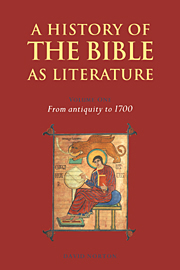Book contents
- Frontmatter
- Contents
- List of plates
- Preface
- List of abbreviations
- 1 ‘This treasure in earthen vessels’
- 2 The early Christians and biblical eloquence
- 3 Jerome
- 4 Augustine and his successors
- 5 The occult text
- 6 The challenge to the translators
- 7 Slaves of the Vulgate
- 8 Creators of English
- 9 From the Great Bible to the Rheims-Douai Bible
- 10 The King James Bible
- 11 Presentations of the text, 1525–1625
- 12 Sixteenth-century movements towards literary praise and appreciation of the Bible
- 13 The struggle for acceptance
- 14 ‘The eloquentest books in the world’
- 15 Versifying the Psalms
- 16 ‘The best materials in the world for poesy’
- Appendix
- Bibliography
- General index
- Biblical index
- Plate section
3 - Jerome
Published online by Cambridge University Press: 05 June 2012
- Frontmatter
- Contents
- List of plates
- Preface
- List of abbreviations
- 1 ‘This treasure in earthen vessels’
- 2 The early Christians and biblical eloquence
- 3 Jerome
- 4 Augustine and his successors
- 5 The occult text
- 6 The challenge to the translators
- 7 Slaves of the Vulgate
- 8 Creators of English
- 9 From the Great Bible to the Rheims-Douai Bible
- 10 The King James Bible
- 11 Presentations of the text, 1525–1625
- 12 Sixteenth-century movements towards literary praise and appreciation of the Bible
- 13 The struggle for acceptance
- 14 ‘The eloquentest books in the world’
- 15 Versifying the Psalms
- 16 ‘The best materials in the world for poesy’
- Appendix
- Bibliography
- General index
- Biblical index
- Plate section
Summary
The Old Latin Bible
The early Church was Greek-speaking. It had its Scriptures in Greek, the divinely inspired Septuagint and the writings that slowly shaped themselves into the NT canon. But, by the end of the second century, if not earlier, there were Christian communities that spoke Latin only, and so Latin versions of the Scriptures began to appear. By the fourth century the western Church had largely forgotten Greek: its Bible was the Old Latin Bible, the haphazard product of numbers of unknown translators and revisers. This version or, more probably, these versions are the subject of most of the comments so far noted on the language of the Bible. Some modern scholars have tried to throw a positive light on their language: Mohrmann, for instance, writes that ‘they were in no way “barbarous” and in fact reproduced the original texts with a good deal of finesse’, but the almost universally hostile ancient verdict, formed from the perspective of classical Latin, had its justice. From the classical point of view, they were barbarous, that is, foreign, not just in origin and thought but in their language. The limitations of Latin, as against Greek, as an abstract language and, particularly, its lack of Christian (or Jewish) religious words caused a foreignness of vocabulary. The Old Latin versions sometimes adopted words from the Greek, such as baptizo, or forced Latin words into new meanings, or coined new words to match the Greek.
- Type
- Chapter
- Information
- A History of the Bible as Literature , pp. 30 - 40Publisher: Cambridge University PressPrint publication year: 1993



